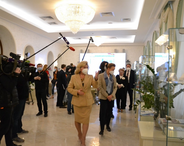On 20 October 2020, the High Commissioner for Human Rights in the Russian Federation Tatyana Moskalkova and Secretary-General of the Council of Europe Maria Peichinovich-Burich held a meeting at the House of Human Rights in Moscow.
The High Commissioner noted that the meeting of the Russian Ombudswoman and the Secretary General of the Council of Europe is taking place at a symbolic moment - in the year of the 70th anniversary of the signing of the European Convention for the Protection of Human Rights and Fundamental Freedoms and on the eve of the 25th anniversary of the Russian Federation's membership in the Council of Europe.
In her speech, Tatiana Moskalkova thanked Maria Pejcinovic-Buric for her assistance in developing close interaction and constructive relations with the Council of Europe, as well as for confirming her participation in the International Conference on Human Rights on 17 November 2020, dedicated to the exchange of information and best human rights practices in the context of the COVID-19 pandemic.
The High Commissioner also remarked that, at present, cooperation with the Council of Europe continues to develop within a number of joint programs: cooperation continues in the implementation of the National Action Strategy for Women 2017-2022, the concept of a penitentiary project is being coordinated with the Ministry of Justice of the Russian Federation, and a program HELP is being planned to provide assistance for women and people with disabilities.
Tatiana Moskalkova also spoke about the activities of the institution of the Russian Ombudsperson regarding the dealing with citizens’ appeals, the practice of the federal and regional commissioners during the COVID-19 epidemic, improving legislation and legal education.
The federal Ombudswoman paid special attention to a number of acute issues, such as the use of the Council of Europe platform as a lever for political pressure, which makes the lives and destinies of people fade into the background, systematic discrimination of the Russian and Russian-speaking population in the Baltic countries and Ukraine (preservation of the non-citizen status, closure of Russian-language schools, destruction of cultural monuments, falsification of history), sanctions against residents of Crimea.
For example, a resident of Latvia, who had been living in the territory of the Republic of Latvia for 40 years, had a family and a home there, was nevertheless deported from the country, addressed the Commissioner with the petition.
According to Tatiana Moskalkova, the fate of Russian citizens who got detained in the European countries on unsubstantiated allegations and then extradited to third countries, deserve special attention.
“We will continue to fight for their lives and defend their rights,” emphasized the federal Ombudswoman.
In turn, Maria Pejcinovic-Buric thanked Tatiana Moskalkova for her active human rights work. She especially appreciated the personal involvement of the Commissioner in the adoption of the law, which had made it possible to transfer the convicted person to a penitentiary institution near his place of residence or the residence of his close relatives and called this a “historic move” in protecting rights in Russia.
At the end of the event, the High Commissioner and the Secretary-General held a joint briefing, where they commented on the most pressing human rights issues and spoke about plans for further cooperation.
Source: Office of the High Commissioner for Human Rights, Russian Federation

